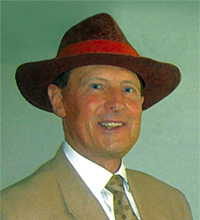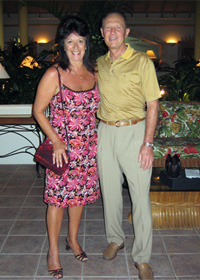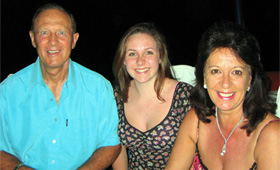Famous England batsman and TV commentator Geoff Boycott beat cancer and he puts a lot down to Chris Woollams’ personal help and knowledge - he calls Chris, the cancer expert, the Cancer Guru!

Hitting Oral Cancer For Six
Geoff beat cancer, and it is an incredible story. After being diagnosed with a cancer on the back of the tongue, he then heard worse news. The doctors were going to break his jaw, go in and cut it out, then give him chemo and radiotherapy - he would never speak on TV or radio again.
So he rang Chris Woollams. "Right from the start, Chris was always there for me. He planned my whole programme - diet, supplements, exercise - and gave me Parafree because he was convinced I had a parasite. He was right. 8 weeks later, the oncologists were amazed - I only ever had radiotherapy. No surgery, no chemo. Fantastic. Chris beat cancer for me".
Eleven years ago, legendary Yorkshire cricketer Geoff Boycott, now 71, had a rough innings with cancer. But with incredibly positive input from his partner Rachael, he toughed out the treatment, and is now fully back in play as an international commentator.
Oral Cancer - The Facts
The couple explain how Chris Woollams’ book, Everything You Need to Know About Cancer became a Bible, steering them to seek complementary support during Geoffrey’s radiotherapy, to detox him and change the family’s way of eating. Geoff has recently included 20 pages on the help Chris gave him in his follow up book.
"Chris suggests that more people die of ignorance than actual cancer" says Geoffrey. "We are just so grateful to have been informed. My mother died of breast cancer because she ignored a lump under her arm. She left it too long because she was frightened. My message to people is don’t delay and don’t think your symptoms are going to go away as if some fairy has waved a magic wand. For God’s sake go to a doctor, and if you are not satisfied with his answer, then get yourself to a specialist. The sooner they get hold of the cancer, the more chance you have of surviving."
It was a perfectly ordinary August morning when Geoff Boycott felt a lump in his neck when shaving. Fit and feeling fine, he was briefly in Jersey, giving an after-dinner speech. "It was a small, hard invisible lump, which I could just feel under the skin," Geoffrey recalls. "I saw my doctor within 36 hours and he sent me straight to a specialist to have the lump removed and biopsied. When cancer was diagnosed I was referred to oncologist Catherine Coyle at Cookridge Hospital, Leeds, who would, actually, have preferred the lump not to be touched. Ultrasound revealed that I had in fact, two small secondaries in my neck and shoulder, and a primary tumour at the base of my tongue."

My message to people is don’t delay and don’t think your symptoms are going to go away as if some fairy has waved a magic wand

Initially it was thought the primary was quite small, so surgery was planned to remove it - at least eight hours in theatre, involving a broken jaw. "This didn’t sound at all pleasant" Geoffrey reflects drily, "The idea, in fact, was doing my head in." But then Leeds changed their original opinion and decided the tumour was the size of a small orange. Seeking a second opinion from Nottingham otolaryngologist Patrick Bradley, national lead clinician - head and neck cancer in the NHS, Geoff learned that it was in fact the size of a 50p piece. But he was also told it was impossible to assess in advance exactly how big and diffuse the underlying parts of the primary tumour might be. Once surgeons started cutting underneath, there could be damage to Geoffrey’s vital vocal chords, or some cells left behind. "I bloody well didn’t want them cutting it out" says Geoffrey "so I was happy when it was decided to go the chemo and radiotherapy route instead."
Happy, was not of course, the prevailing sentiment. "When it hits, cancer strikes fear into everybody. You think ’Jeeze, don’t make any plans!’ Cancel everything, which is what I did...a trip to Australia...my annual membership renewals...I cancelled them all, because I’m a realist and I tell everybody straight, that those first few days were extremely upsetting and traumatic. There’s no shame and embarrassment in being down and having a good cry - just for a few days. But it’s no good feeling sorry for yourself in the long term and thinking ’Why me? Woe is me!’ I’ve always had a positive attitude, and so I turned this around. Sitting and crying doesn’t help. You’ve got to have a good go at beating this bastard because otherwise it’s going to beat you. I said to myself ’Listen, this isn’t going to get rid of the cancer. You’ve got to pick yourself up and say, Right, what the hell are we going to do?’"

I wanted to know the problems and how difficult it was all going to be

Fortunately it was very much a case of "we". If he had to have cancer, Geoffrey gained confidence from having the "frank and feisty, 40 year old, Irish Miss Coyle" on side. "She was dead straight with me, which I liked about her. Some people don’t want to know. I did - I don’t think there’s any point in flannelling people and I wanted to know the problems and how difficult it was all going to be. I asked if the treatment was going to be tough. She said ’Yes, very.’ I said, ’What, really tough?’ She said ’Really, really tough!’ ’Jesus Christ!’ I said, ’What are my chances?’ Miss Coyle said that they were about 60-80 per cent. "Can you give me 90 per cent" Geoffrey bargained. Miss Coyle couldn’t, but stressed that she felt Geoff’s chances were really good - in an entirely different bracket from what they would have been for a smoker or a drinker.
Geoff’s partner Rachael, the sparky attractive mother of their 17 year old daughter Emma, was also committed, from day one, to saving him and to being the informed advocate who gives natural good chances a powerful nudge in the right direction. "When Geoffrey’s cancer became known, we began getting hundreds of messages, pieces of advice and books from literally all over the world" says Rachael. "Geoffrey was in no state to deal with all this material, so I filtered through it, and the one book that really stood out was Chris Woollams’ ’Everything You Need to Know to Help you Beat Cancer’." Rachael read, highlighted vital passages and passed the book on to Geoffrey who found it ’simple and accessible’. "It all made sense". The Boycotts contacted Chris, and also found their way to Dr Patrick Kingsley for holistic support. "Reading Chris’s book", says Rachael "I immediately realised that I had to detox Geoff. So we asked a local girl, Stacey Darrell, from Pickering, to come in for three days to show me what to do. I also had to learn a completely different way of cooking - it’s back to basics, wholesome cooking, with organic meat and no oven-ready foods, but everything prepared from scratch, even though it takes longer." "Chris is so wise to say that you should get yourself a buddy as soon as you get cancer" says Geoffrey, "because when you’re full of pain and so stressed, you simply can’t take on board what’s happening to you."

Patrick Kingsley talked about contributory factors to Geoffrey’s illness, among them having his spleen removed following a childhood accident. Believing that he therefore lacked natural defences, Geoffrey had opted for a lot of inoculations, which Patrick Kingsley thought relevant. Geoffrey had also had his tonsils out at 22 "which Dr Kingsley said, indicated that I had a lifelong intolerance to dairy" "From Chris’s book we also learned that cancer loves dairy and sugar" says Rachel, "so I began buying soya margarine, oat milk and using fruit sugar as a sweetener." Patrick Kingsley prescribed supplements to help flush the chemo residue from Geoffrey’s body, and during radiotherapy, Dr Damien Downing in York gave Geoffrey intravenous nutrients every week to support his immune system. "Whatever Geoffrey was taking, we always reported to Miss Coyle, as this was very much complementary, never alternative, therapy."But the overall ’plan’ lay in Chris Woollams hands: Diet - supplements - exercise - parasite killer - even apricot kernels.
A gentle enquiry about whether he resisted the loss of hearty northern trencherman’s food, exasperates Geoffrey: "Why stereotype me and all Yorkshiremen as dour, difficult, won’t-change-our-minds-on-anything?" he demands, reasonably enough. "It’s like thinking everyone in the city wears a bowler hat and goes to work with an umbrella, like John Steed of The Avengers. Journalists have often called me dour, and stubborn, which is a load of s*** from people who’ve never been north of Watford! I’m the most open-minded of anybody. During treatment I went for acupuncture to Chesterfield and even got into Feng Shui with Rachael, and slept in different rooms of the house, facing different ways as the Master who came here recommended. My only sticking point was the brown rice Rachael gave me, which I know is good for you but I hated it! I told her she could stick it where a monkey sticks its nuts!"
The frank, fighting spirit, familiar to all Boycott fans, was to prove Geoffrey’s mainstay during months of treatment in 2002. After chemo gave the cancer its first powerful kick, 35 daily sessions of radiotherapy followed, lasting seven very long weeks. The Boycotts still have the heavy duty face mask which Geoffrey wore, bolted down to keep him still, while radiation was aimed with precision targeting. "Miss Coyle explained that the effects were particularly grim because she wanted to give me the most aggressive dosage she thought I could stand - at strength 70 rather than 50 or 60 which is more usual in the UK." Geoffrey was told from an early follow-up scan that the secondary tumours were already responding - an encouraging sign that the primary would follow. In the early weeks of radiotherapy he continued to feel "great", still eating well and walking round the local golf course.

The frank, fighting spirit was to prove Geoffrey’s mainstay during months of treatment

"This will change" warned Miss Coyle. "And how dramatically it did" Geoffrey reflects. "As the radiation built up, I developed terrible raw burns from underneath my chin right down to my chest. I had to cover them with burn pads 24 hours a day, because I couldn’t bear the air to get to them. They had to give me morphine, and lots more painkillers; then eventually things got so bad that my throat was too burned to eat.
I went on to soft foods, and eventually couldn’t get anything down but soup. After three or four treatment weeks I also started to lose energy. So, doped up for the enormous pain, I spent most of my time in a chair watching a bit of TV, but mostly nodding off. When I was first diagnosed, some people urged me to go and get my treatment in Switzerland or the States. But I had all mine on the NHS and I’m glad we listened to those who said, ’No, stay close to home, because you need the people who care about you close at hand and the familiarity of your own creature comforts.’ They were so right. Don’t let anybody tell you this treatment is a picnic. It’s not just unpleasant it’s a whole lot more awful than that.
"By the final week I’d lost 23 kilos in weight; skin and bone like someone who sadly comes from one of those awful concentration camps. Then I was whisked straight into hospital to have a feeding tube put in. It sounds awful, but in a way it was a relief no longer having to try to get something down." "Geoffrey" Rachael adds "was then fed eight or nine hours out of every 24. We found a way of charging the batteries on his machine so he could actually be fed in the car, and Emma, our daughter, who handled Geoffrey’s illness with such maturity, also helped put the feed into the tube. The dieticians who supplied the feed were brilliant, because when I said that Geoffrey couldn’t be tube fed the usual dairy product, they didn’t know of analternative, but they did go off and research it for us. So then he had a soya feed for four and a half months."

You have to stay focused and positive because it is very easy to get down

Sick as he was, Geoffrey never felt he might give up. "I counted the 35 treatment sessions down as if I was counting my runs down to 100. Every day, it was all about having my treatment, and getting through it, getting through the day to get to the next day. You have to stay focused and positive because it is very easy to get down and think you are going to die. And that is not going to help. You may still die; I understand that. I’m pretty strong mentally, and I think I’ve proved in my career that I’m confident and positive. But that’s no guarantee you are going to survive. None at all...but at least it gives you a better chance of your body recovering. I’m not saying you are in any fit state to start jumping for joy or dancing, no question whatsoever of that...this is life and death and it could all be extremely depressing. But we did occasionally have a laugh..." "While his burns were so bad" says Rachael "I used to say, ’You’re lucky darling. You’re getting a free chemical peel, for which some people pay a fortune!’"
Lean and lively, Geoffrey now looks the antithesis of the burn-ravaged spectre of 2002. He remembers recovery being "a slow process because you are just so tired all the time. But given decent food and drink and treatment, the body has a great capacity to redeem and heal itself." Although recuperation from lifethreatening illness was not the trigger, Geoffrey and Rachael finally put their long, live-in relationship on a formal footing in February 2003; they married at Wakefield registry office. The vivacious woman whom Geoffrey had introduced so long as "Meet my Rachael" finally got to be Mrs Boycott.

But between August 2002 and April 2003, when Geoffrey and Rachael could take a holiday, seemed "a bloody long time, I can tell you!" It was late November before Geoffrey felt really strong enough to work again - and then only part time: "It’s therapeutic to work and get back to normality; they advise you to work, but also to rest: Work and rest, I was told. Don’t overtire yourself. So I took it easy. But now everybody says I look pretty well, though I wouldn’t say I’m quite as fit as if I hadn’t had cancer. I still sometimes get a bit tired by 10.30pm at night. It’s irritating that I now have no salivary glands - the radiation to my throat and tongue killed those - so I always have to have a bottle of water at hand to sip. And it was a long time before food stopped resembling cardboard and my tastebuds returned - at least 90 per cent of them."
Boycott was certainly back on full form as he talked us day by day through England’s glorious return of the Ashes this summer. As we spoke, he was packing his bags - not forgetting his daily supplements for a working trip to Pakistan.
In their pretty yellow kitchen, Rachael was peeling parsnips and carrots to roast alongside an organic chicken. The Boycotts are now buying a house near Capetown in South Africa where they plan to enjoy sunshine winter months, though England will always be home. "I’m pleased to be here" says Geoffrey, meaning here in the world, not specifically his much-loved home county. "I don’t say I’m cured, but I think I’m living proof that you can recover. When you have something as drastic as cancer, it doesn’t change who you are or your basic characteristics. But it does give you a different perspective, a softer outlook on life, perhaps. I think it helps that I’ve always lived life for the present. I realised in my sporting life that if I made zero in one innings there’s always another one round the corner, so I don’t dwell too much on the past I’ve renewed all those annual membership subscriptions now. So what I’d say to anybody with cancer is that you’ve got to deal with it, but then you can move on. Don’t look back. Look forward."
Seven years on from this interview, and now back firmly on TV and radio commentating on cricket, Geoff spoke at a charity dinner in Lords to raise money for CANCERactive. His opening line was "I’m only here tonight because of Chris Woollams. No, seriously. I’m ONLY here tonight because of Chris Woollams". According to his follow up book Geoffrey still talks to and corresponds with Chris Woollams. "He’s still always there for me; I can’t thank him, or praise him, enough".